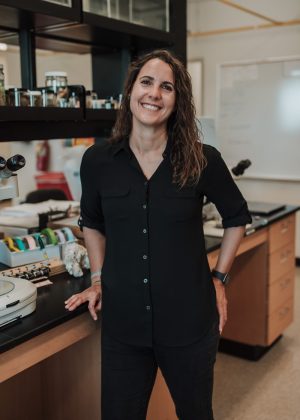Q&A with Dr. Jennifer Beseres Pollack, Environmental Science Chief Editor for Experimental Results

This is the latest of an ongoing series of interviews with people involved with our new Open Access journal, Experimental Results – a forum for short research papers from experimental disciplines across Science, Technology and Medicine, providing authors with an outlet for rapid publication of small chunks of research findings with maximum visibility. This is the first of our interviews with our Chief Editors.
What is your current job title both within Experimental Results and outside of the journal? Where are you based in the world? What is the goal of your research and how does it relate to the journal?
I am an Associate Professor in Marine Biology and Chair for Coastal Conservation and Restoration at the Harte Research Institute for Gulf of Mexico Studies, Texas A&M University-Corpus Christi. I am part of an interdisciplinary team of researchers from the U.S., Mexico, and Cuba with expertise in natural and physical sciences, economics, law, and policy whose mission is to provide science-based solutions to challenges in the Gulf of Mexico. Within Experimental Results, I have been serving as the Environmental Science Chief Editor for approximately 6 months. I am a broadly trained marine ecologist, but I tend to focus my research on questions related to marine habitat conservation, restoration, and management.
In the field of restoration ecology, we have been talking for years about the publication bias toward positive results or “successful” research projects, which limits scientific advancement. Moving forward, it is critical that all research findings, not just data from selected experiments, are available to make scientific progress more efficient and effective.
How did you first become familiar with Experimental Results? What motivated you to become an editor?
I was fortunate to learn about Experimental Results before its official launch as a journal. Through conversations with Alison Paskins, Commissioning Editor at Cambridge University Press, I learned that she and her colleagues had conducted an in-depth engagement of the research community and had quickly identified the demand for an open access venue to publish concise experimental findings that do not necessarily fit the traditional publication model.
I am happy to serve as chief editor for the Environmental Science topic area because of the journal’s unique approach to ensuring dissemination of valid scientific results, regardless of their positive or negative outcome. Experimental Results exists to solve the problem of incremental, unexpected, or null experimental findings not being published, expanding the limits of the traditional publication model. For these reasons, I am quite excited about the opportunity to help move this new journal forward.
Do you have any advice for authors submitting to Experimental Results?
My best advice is, just do it! Many of my colleagues have expressed apprehension about submitting something to the journal because it is new and because of the unique approach to publishing short (~2 page) articles—they don’t know what to expect. To that end, I strongly encourage authors to carefully review the Instructions to Contributors and take a look at some published papers to inform the preparation of their own submissions. The biggest difference will be the length guidelines—the journal does not publish manuscripts that include the full narrative of a traditional paper, instead seeking to be as concise as possible.
Another submission requirement is to include both data citation and data availability statements. Experimental Results does not host data, instead, authors are asked to submit their dataset to a suitable data repository. As an example, I archive my data with GRIIDC, a recognized repository for Gulf of Mexico data sharing with an easy-to-use process for submitting datasets. Researchers are likely aware of specialized repositories used by their research community, and there are a number of generalist repositories available as well. When selecting a data repository, keep in mind that Experimental Results encourages the use of those that make content FAIR (Findable, Accessible, Interoperable and Reusable).
What are you most looking forward to seeing as Experimental Results publications begin to go live?
It will be interesting to see what kinds of unpublished data exist within researcher files or as part of the gray literature that until now, have not been accessible to the broader scientific community. I can guess that every one of us can think of one, if not a handful of experiments or studies whose results didn’t quite warrant a full manuscript, and therefore were never published. These results are still important, as they represent incremental contributions can be used to move the field forward. Although we may chat about these results with colleagues or mention them as a side note in a conference presentation, until now it has been very difficult to disseminate this information. Experimental Results allows these hard-earned research results to be shared more widely, enables researchers to receive credit for their contributions, and facilitates scientific advancements to occur more efficiently and effectively. In the future, I believe we will see that this journal has laid the groundwork for a new path to publication that others will follow.






